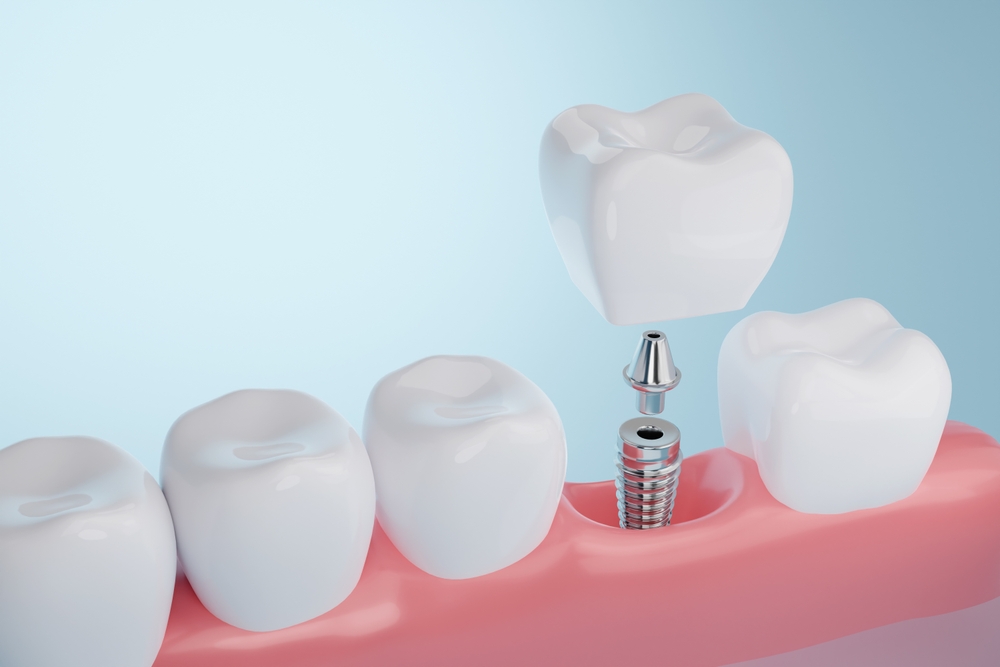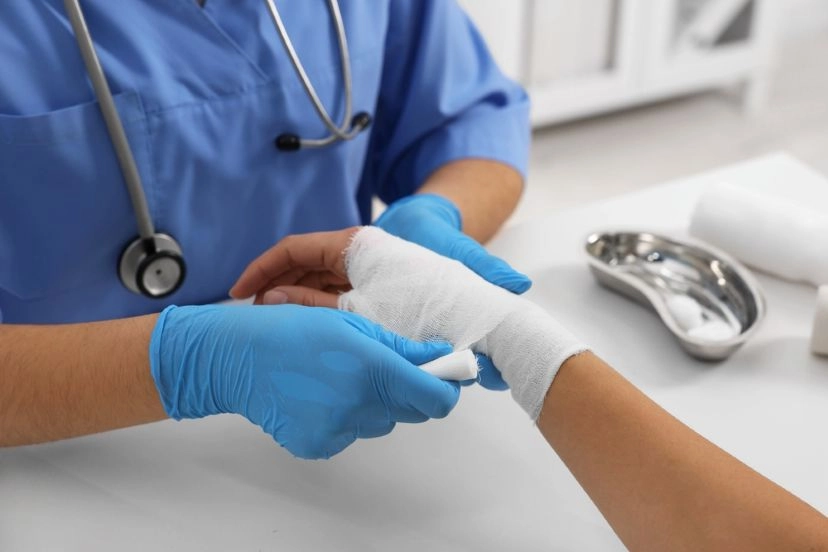Dental Implant

Tooth loss might happen from tooth decay that tooth extraction is required, a broken or chipped tooth from accident, or a tooth that is deteriorated due to aging. Tooth loss affects chewing especially if it occurs to molar tooth; the chewing will not break food down well, this can cause the problem on nutritional aspect. If it happens on the front teeth, it will affect the food bite. In addition, tooth loss makes many people lack confidence in speaking, smiling and socializing.
If we do not resolve the problem by creating the new tooth, the nearby tooth will shift and move into the empty space which causes more problems. Dental implant is another option that we can receive new tooth to replace the lost one and bring back our happy life.
Dental implants are artificial tooth roots that are surgically placed into space in the jawbone left by the missing teeth. After that, denture or crown will be done to attach to the artificial tooth roots. The material for dental implant is titanium that is durable, and able to support the chewing well. The body also responses well to the titanium; there is no allergy or resistance. It reduces inflammation on oral tissue and the bone cell attaches quickly, hence the dental implant is strong. It helps chewing become as good as before. With the elaborate step of tooth creation, tooth implant allows the patients to perform activities with confidence.
Computer Guided Implant Surgery is the planning of dental implant with the use of computer before the surgery. During the planning step, 3-dimension x-ray (Cone-Bean CT) will be performed to find the location and the best appropriate size of implant which does not affect the important oral organs and harmful to the patients such as the nerve, air cavity beside cheek etc. 3-dimension x-ray will allow the dentist to view the oral structure clearly which will help reduce mistakes from dental implant surgery. Therefore, dental implant surgery will be more precise and effective. When the location of dental implant is marked, models made of your teeth and jaw will be developed for surgery.
Preparation before dental implant surgery
• The patient should arrive at the hospital at least 15-30 minutes before appointment time
• In case the patient has any drug allergy or has any underlying diseases that require medications continuously, the patient should take medicines as normal except some medicines that needs to be stopped before the surgery. The patients should not stop taking medicines by themselves; they should consult with the dentist before appointment date.
• For dental implant surgery, the dentist will examine oral condition first to check whether it is appropriate for doing dental implant or ready to start dental implant. If there is any oral problem that will become an obstacle for doing dental implant, the patient should receive treatment first. In some cases, after undergoing a CT scan, it is found out that the bone that supports the tooth is not enough due to marginal bone loss or other causes. Bone graft and sinus elevation will be done by dentist specializing in oral and maxillofacial surgery which will make dental implant more complicated. If the result from the X-Ray is normal, the suitable implant will be assessed in term of the length and the size of the implant. Then, the patient will be scheduled for the dental implant surgery.
Dental implant steps
• The dentist will examine your oral health and do dental X-Ray to evaluate and measure the amount of bone in the jaw. If the bone mass is insufficient, bone graft may be required to have enough bone to support the implant
• Following that, artificial tooth roots are placed in the jawbone, waiting 3-4 months for the artificial tooth roots to firmly anchored into the jawbone
• Gingival former is placed to form the gum around the tooth and wait for 10-14 days to gain the suitable shape of gum. In this stage, if the dentist assess that the artificial tooth root is strong, gingival former may be placed on the same day of artificial tooth root treatment
• Put the piece where the crown will attach, the mouth will be modeled and the model will be sent to do the crown in the next step.
• After 10-14 days, the dentist will place the crown which is beautiful as same as natural tooth and can be functioned effectively.
Advantage of dental implant
• The appearance is attractive and it achieves the similar function to natural tooth, as it is the fixed implant which cannot be removed.
• It does not need to grind the adjacent teeth compared to dental bridge, natural tooth is not lost. It reduce complications such as teeth sensitivity, tooth pain or root canal treatment in the future
• Artificial tooth root is placed into the jawbone, the jawbone remains and dissolves that is similar to natural tooth
• Not making the bone in the area of lost tooth collapse
• Able to function well, convenient and more safe than removable denture
• Dental implant is different from dental bridge although it is the placement of denture in particular area. Dental bridge needs the natural tooth that is adjacent to the lost teeth to attach, which will be useful if you have a strong natural tooth on both sides of the gap. On the other hand, dental implant attaches to the bone which can be performed on many teeth and the tooth is so strong
• Dental implant can be cleaned by dental floss like a natural tooth
Disadvantage of dental implant
• Dental implant takes a longer time than dental bridge which the treatment takes only 1-2 weeks. Typically, dental implant without bone graft will take 3.5-4.5 month to allow the bone to attach with the artificial root completely and also for the effective use.
• Dental implant is not appropriate for people with certain underlying diseases such as uncontrolled diabetes mellitus, severe osteoporosis, patients who receive Bisphosphonate for osteoporosis treatment, cancer patients who receive radiotherapy, a heavy smoker who smoke greater than 10 cigarettes per day, patients with other underlying diseases that is a life threatening condition, patients who are afraid of the surgery and kids patients who still have jaw and facial growth.
Complications of dental implant
• Infection which mostly comes from contamination in the surgical area or surgical equipment. After denture is placed, complications like gum disease may occur due to the poor oral hygiene or poor cleaning. Implant abutments are not cleaned well, and the gums are stimulated by plaque attached to the implant.
• Plaque and bacteria may build up around the dental implant crown which is mostly caused by scratches on the surface of the implant, and bacteria can multiply. In addition to the smoothness of the foundation during implant making and processing, Implant needed to be cared carefully by the patient and during the surgery as well.
• Poor connection between screw and bridge, poor oral hygiene or chronic infection which may cause receding gum and bone loos. It occurs in bone tissue of implant and related to gum disease. Dental implant infection is associated with dental implant problem that is not resolved for a long period.
• Dental implant injury- dentures can be accidentally hit and if the hit is severe, implant may become loose. The part connected the dental implant like middle screw and bridge screw can be broken and this often results from the wrong chewing.
Recommendation after dental implant surgery
• Clean the surgical area and around the gum by using dental floss to remove food particles and keep gauze on the surgical area with some pressure around 1 hour. If there is a blood or saliva, swallow it, do not spit. If there is still bleeding, firm pressure for another hour
• Do not suck on ice. Apply the ice packs to the outside of the face near the implant site 15 minutes on and then 15 minutes off in the first 48 hours. Applying a cold compress will help stop the bleeding and minimize swelling
• Do not rinse your mouth with water or use mouthwash in the first day after the surgery. Clean your teeth with brushing except on implant site. Use a cotton swab moistened with C-20 solution to wipe the wound area followed by thoroughly rinsed with saline 4 syringes at a time after brushing your teeth in the morning, evening and before bed.
• Take medicines as prescribed by the physician in the correct amount and time. If there is an allergy such as rash, difficulty breathing, or vomiting, stop taking medicines and bring that medicines to consult the doctor immediately
• Use C-20 solution for 1 minute after every meal and before bedtime
• If there is a swelling, apply with warm water after day 2
• Do not drink alcohol or have spicy food, too hot food and do not smoke
• If there is a pain, swelling or any other abnormality, visit the doctor for examination
• If you have stitches placed, they should be removed in 14 days. Dental exam should be done continuous


